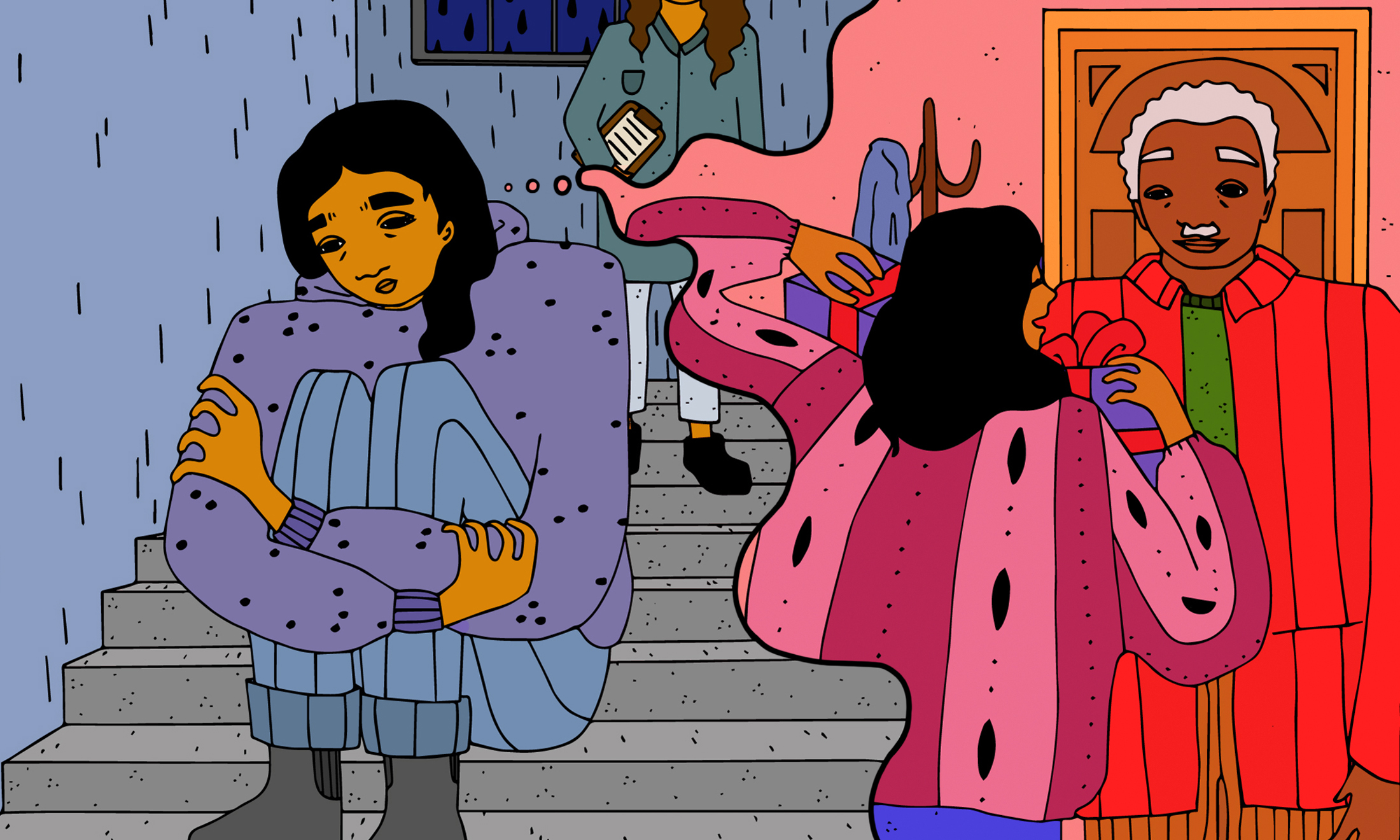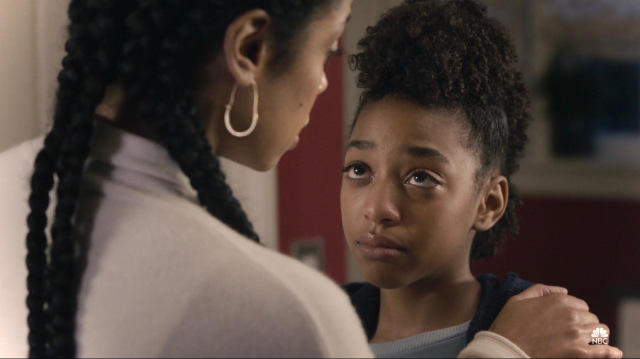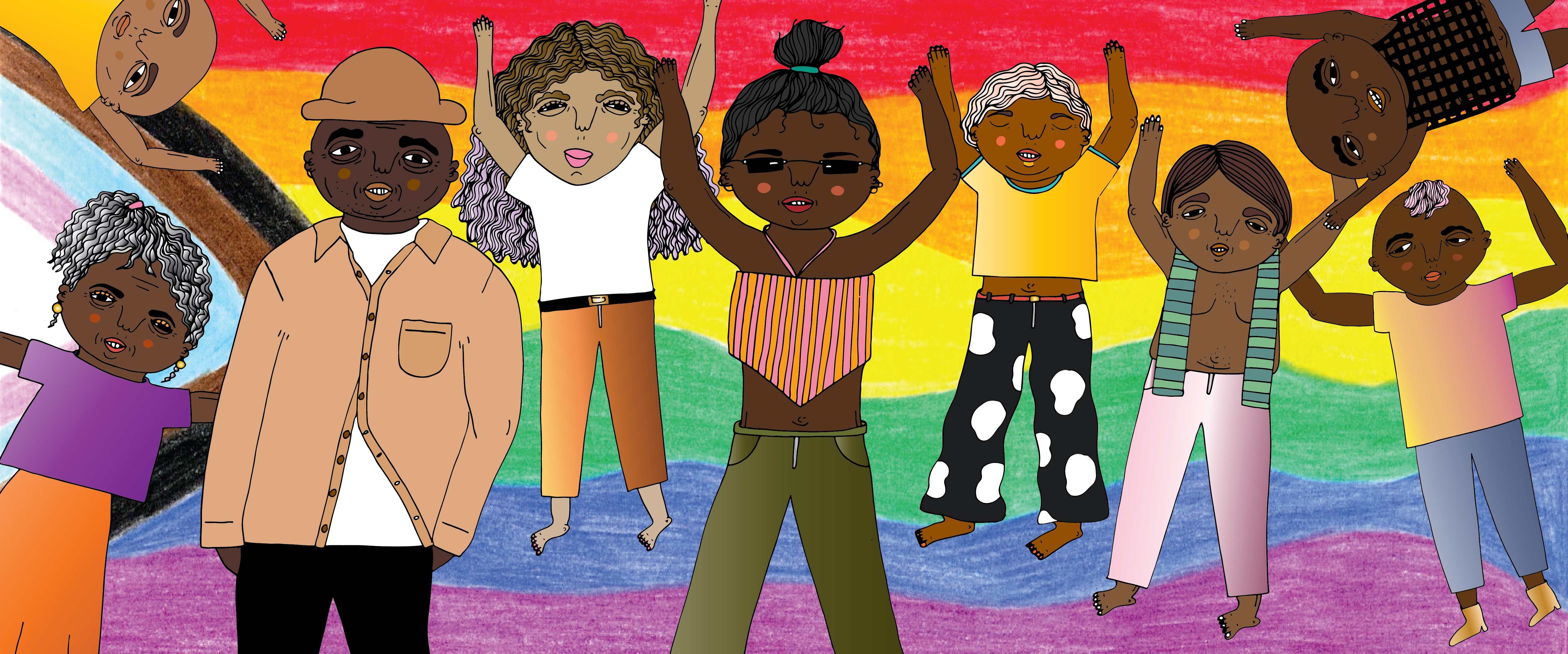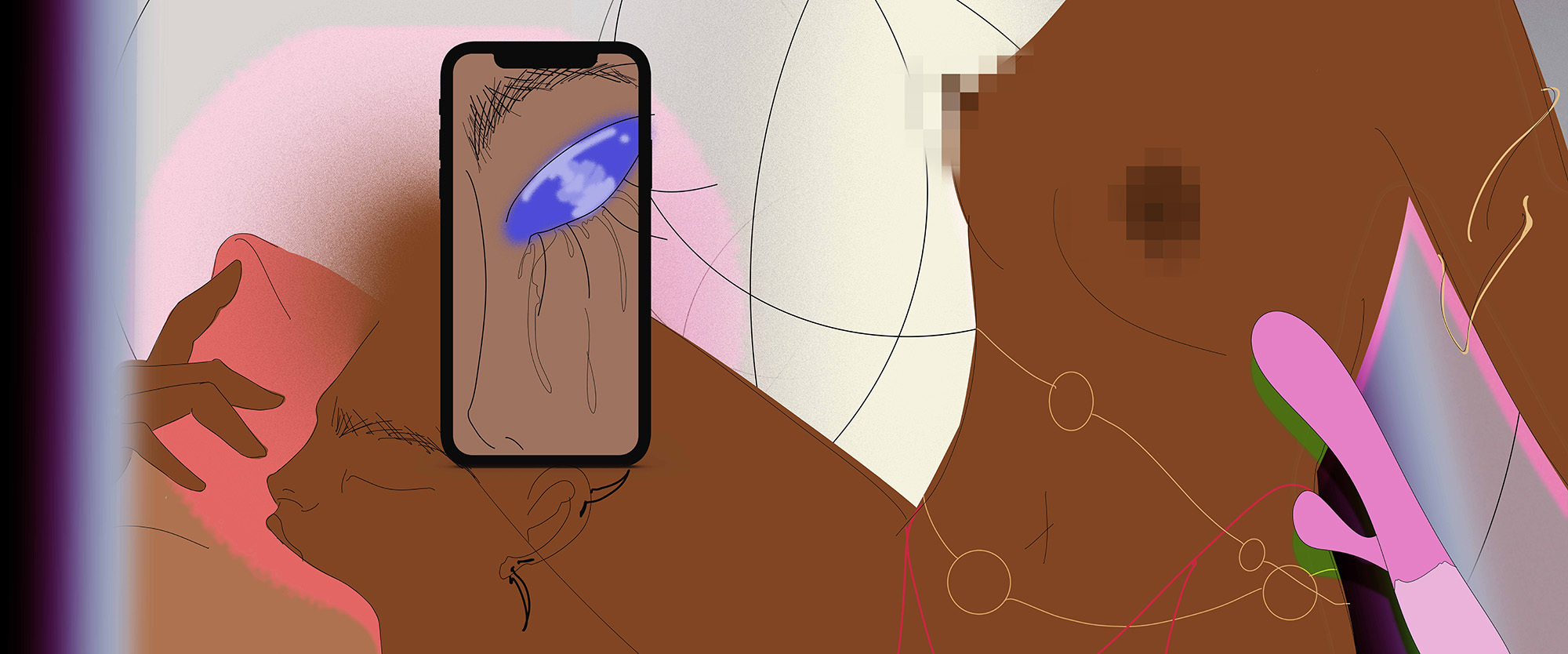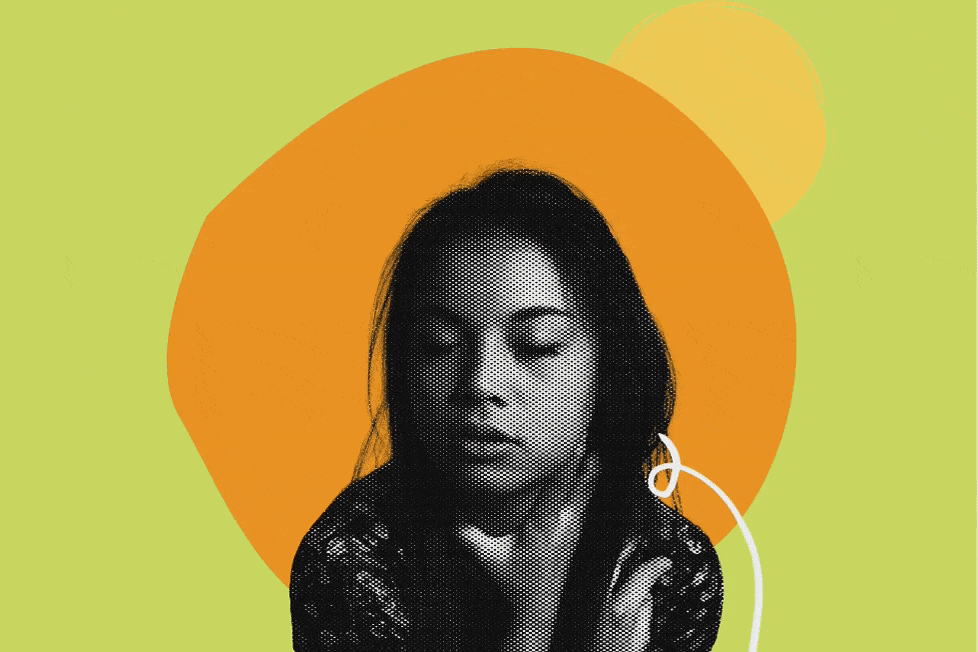
Illustration via Canva
Lockdown is leaving QTPOC homeless people out in the cold
The UK government has called for councils to take in homeless people, yet queer youth are being told to sofa surf
Bex Shorunke
23 Apr 2020
The UK is on pause. Days are delineated by BBC updates as we’re hit with an hourly barrage of Covid-19 facts and warnings. Schools are out until September (bye Prom), with pubs, shops, and high brow restaurants (Morley’s included) closed indefinitely. While a lot of Britons shield themselves in the comfort of their own homes and acclimatise to that space being the length and breadth of their existence, the situation is far bleaker for the country’s LGBTQI+ homeless youth.
A quarter of young people facing homelessness in the UK identify as being a part of the LGBTQI+ community. Of that figure, 61% are people of colour, rising to 79% in London. Having to flee, or being stuck in an environment filled with familial rejection and mental, physical and verbal abuse just to be yourself is undoubtedly worse than being stuck at home. Unfortunately, these are commonplace triggers for QTPOC during the crisis.
A myriad of reasons can coalesce to cause a young queer person of colour to become homeless. These include mental illness, low-income work or no-income and outright fear of the community they live in. For some, like Chiyo, an Afro-Latinx 23-year-old trans man, a combination of all of the above has surfaced during this public health crisis.
“I’ve lost all my income and all my work as clubs and bars are closed down which has a domino effect on my mental health,” explains Chiyo. They had already been sofa surfing for the last year but moving from household to household has been made harder by lockdown rules. “I’ve always had the safety of my mum’s house but she’s an old woman and is disabled living on her own,” they say. “As soon as coronavirus hit the UK I isolated her straight away. I’ve been lucky to stay with one friend since we’ve gone into lockdown, but there are seven people in this house and I’m always aware I’m a guest which, after a couple months, takes a toll mentally.”
This is something Leigh Fontaine, who is the service manager at akt, a charity working on the frontline to support LGBTQI+ young people facing homelessness or living in a hostile situation, has seen first hand. Their team has reported that the current climate is having an adverse effect on young people’s mental health. “One young person who had lost their job due to the crisis, and therefore the ability to move out from a family home with homophobic parents, felt entirely let down by the government,” says Leigh. “Before coming to us she asked her local authority for help. They responded they would not explore interim accommodation options for her until they had proved ‘priority need.’ The team are still working with the local authority to help them understand the risk and impact this situation is having on her.”
Alternative options for Chiyo are few and far between. Getting the money together for the initial deposit required to rent a place is difficult, especially as their mother relies on their financial support. Outside of their friends, they do not have a support network. Instead, Chiyo opts to contribute money towards the place where they are couch surfing.
While trying to figure all of this out, health services are under so much pressure that their recent top surgery check-ups have been delayed. “I had surgery on February 10 and haven’t seen anyone since. I’m supposed to go to the surgeon this week to ensure my scars are healing and the gender psychologist next month for my mental health to be assessed. I haven’t anything from anyone – it’s concerning.”
Chiyo isn’t the only QTPOC struggling with the current lockdown. The situation is proving hard for many. Hostile family dynamics and limited access to community LGBTQI+ organisations is having a pernicious effect on their mental health, wellbeing and safety.
“Young people are being threatened with being kicked out of temporary accommodation but are not actually being kicked out. This is impacting their mental health as it’s like living on a knife-edge of uncertainty,” explains Lucy Bowyer, director of services at akt.
“Over the past few weeks we’ve been receiving a spike in the number of referrals for vulnerable LGBT young people struggling with homophobia and adversity in their communities,” she continues. “Our London office is currently supporting 130 young people, 68% of which are people of colour. We’re seeing them being evicted despite the eviction ban and a lot don’t know their rights.”
“One young person who had lost their job due to the crisis and therefore the ability to move out from a family home with homophobic parents, felt entirely let down by the government”
Homelessness has always plagued QTPOC youth, as highlighted by Robyn, a non-binary British Pakistani and Faz, a British Iranian-Pakistani Muslim trans man. Both were supported by akt after experiencing homelessness in their late teens and early twenties.
“I grew up in a tight-knit Pakistani Muslim community in Birmingham that was very homophobic. If my family had become aware of my trans identity, I would’ve been disowned,” says Robyn.
“As a result, I kept quiet for a while and my mental health deteriorated. When I became homeless it was like I could have the queer thing or the PoC thing. But both exist at the same time. When I was placed in a halfway house in order to survive, I was strongly encouraged by people who had been in a similar position to me to hide my trans identity at risk of being persecuted.”
These sentiments are echoed by Faz. “I first faced discrimination at 22 when I presented myself to the local authority my supposed ‘safe-haven’ after my parents passed. Walking into the homelessness unit they didn’t know how to support me, or the risks associated with me,” he explains. “They basically turned their back, handing me a piece of paper with renting prices despite the fact I wasn’t financially stable.”
The experience was made all the more unpleasant as he was subjected to degrading questions about his gender. “They would ask ‘why haven’t you come out?’ As if it was my fault. It really knocked my confidence,” he explains that it didn’t feel that simple to him. “The concept of coming out doesn’t exist in brown communities – it can result in you being killed or forced to undergo conversion therapy.”
Unfortunately, it has taken the government a malignant pandemic to tackle the country’s homelessness problem. Local authorities are being instructed to house all rough sleepers in the UK immediately for fear they could spread coronavirus. However, for QTPOC young people this presents another issue altogether. They are being placed in hostile environments that do not take into consideration the risks and needs associated with their gender and ethnic identities.
In some examples seen by Stonewall, akt and Outside, vulnerable trans men have been places in men-only hostels. The situations physically put their safety at risk, alongside their mental wellbeing. Staff within local authority are unlikely to be trained on providing mental health support for an individual experiencing the negative impacts of hormonal drugs as a result of their transition.
This is why many LGBTQI+ housing organisations ask for sexual orientation monitoring and support specific to the needs of clients gender and ethnicity to be mandatory for local authorities. A lack of suitable alternative housing options for QTPOC, or indeed housing options that are sensitive to their needs, only serves to exacerbate the issue of QTPOC homelessness.
But what are local authorities’ doing to tackle the problem specifically during coronavirus? “Each local authority seems to have interpreted MHCLG guidance in their own way and have increased gatekeeping,” says Leigh. They are “shocked” that they’ve seen local authorities are “encouraging sofa surfing” for an already at-risk group.
“Islington has been exemplary in their response whereas Hammersmith and Fulham, for example, have authored a ‘do not place’ list for its emergency out of hours service. This avoids emergency teams picking up rough sleepers denied access to support via the day housing teams. This left a young black woman, who was made homeless after family rejection due to her sexuality, with no emergency options.”
QTPOC young people that are experiencing homelessness or living in a dangerous situation are in crisis. They need help more than ever. akt have just launched their emergency appeal #aktogether to galvanise support within the wider community and donations to get QTPOC young people safe housing, food and vital resources.
“We need to be more mindful of the issues QTPOC young people face,” explains Faz. “Once coronavirus has passed there will be a lot of uncertainty around their benefits and job security. This could then lead to them being exploited. [Coronavirus] highlights the critical need for them to be supported now and later.”

Britain’s policing was built on racism. Abolition is unavoidable

How Pakistan’s Khwaja Sira and transgender communities are fearing and fighting for their futures

Their anti-rape performance went viral globally. Now what?



